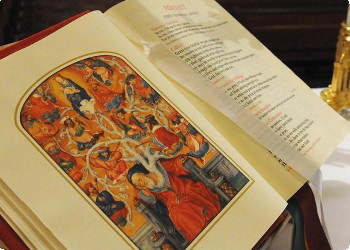Neither do I condemn you. Go, (and) from now on do not sin anymore
17 MARCH (Jn 8,1-11)
These men who lead the woman to Jesus and ask him to emit a judgment of acquittal or conviction to then accuse him to the constituted authorities as subversive, traitor, violator of the law of Moses; they are bad at heart and mind, evil in their soul and body. Who does not cover the sin of the neighbour, warning him in secret, so that he does not sin anymore; he certainly is not a man of God, and if he is not a man of God he cannot seek justice for his brothers. He is an unjust and never might the truth rise from an unjust. The unjust is always false.
In the Old Testament the Lord had made a journey of a millennium in his Law. From a Law that required an exemplary punishment so that others did not sin he himself had passed, with subsequent prophets and mediators of his Word, to a law of forgiveness, conversion, penance and repentance. But even when the Law of the educating exemplariness was in force, he himself had granted pardon to David, who was not only an adulterer, he had also been a murderer. He had killed the woman’s husband and many others to hide his sin. Yet the Lord has forgiven him. The Book of Wisdom, the last revealed will of God in the Old Testament, teaches the truth about forgiveness, repentance, return to the Law of the Covenant, or to the one the conscience feels like Law and for this reason it is obliged to follow.
But as you are just, you govern all things justly; you regard it as unworthy of your power to punish one who has incurred no blame. For your might is the source of justice; your mastery over all things makes you lenient to all. For you show your might when the perfection of your power is disbelieved; and in those who know you, you rebuke temerity. But though you are master of might, you judge with clemency, and with much lenience you govern us; for power, whenever you will, attends you. And you taught your people, by these deeds, that those who are just must be kind; And you gave your sons good ground for hope that you would permit repentance for their sins. For these were enemies of your servants, doomed to death; yet, while you punished them with such solicitude and pleading, granting time and opportunity to abandon wickedness, With what exactitude you judged your sons, to whose fathers you gave the sworn covenants of goodly promises! Us, therefore, you chastise and our enemies with a thousand blows you punish, that we may think earnestly of your goodness when we judge, and, when being judged, may look for mercy. Hence those unjust also, who lived a life of folly, you tormented through their own abominations. For they went far astray in the paths of error, taking for gods the worthless and disgusting among beasts, deceived like senseless infants. Therefore as though upon unreasoning children, you sent your judgment on them as a mockery; But they who took no heed of punishment which was but child’s play were to experience a condemnation worthy of God. For in the things through which they suffered distress, since they were tortured by the very things they deemed gods, They saw and recognized the true God whom before they had refused to know; with this, their final condemnation came upon them. (Wisdom 12,15-27).
A man is just if he thinks like his God. He is always unjust when he does not think this way.
While Jesus went to the Mount of Olives. But early in the morning he arrived again in the temple area, and all the people started coming to him, and he sat down and taught them. Then the scribes and the Pharisees brought a woman who had been caught in adultery and made her stand in the middle. They said to him, “Teacher, this woman was caught in the very act of committing adultery. Now in the law, Moses commanded us to stone such women. So what do you say?” They said this to test him, so that they could have some charge to bring against him. Jesus bent down and began to write on the ground with his finger. But when they continued asking him, he straightened up and said to them, “Let the one among you who is without sin be the first to throw a stone at her.” Again he bent down and wrote on the ground. And in response, they went away one by one, beginning with the elders. So he was left alone with the woman before him. Then Jesus straightened up and said to her, “Woman, where are they? Has no one condemned you?” She replied, “No one, sir.” Then Jesus said, “Neither do I condemn you. Go, (and) from now on do not sin anymore.”
Jesus is a just man. He thinks like his Father. However, today he cannot express the thought of his Father publicly. He reveals it to the accusers through an indirect way. He manifests it directly to the woman, “Go and from now on sin no more.”
Virgin Mary, Mother of the Redemption, Angels and Saints give us the thought of the Father.





